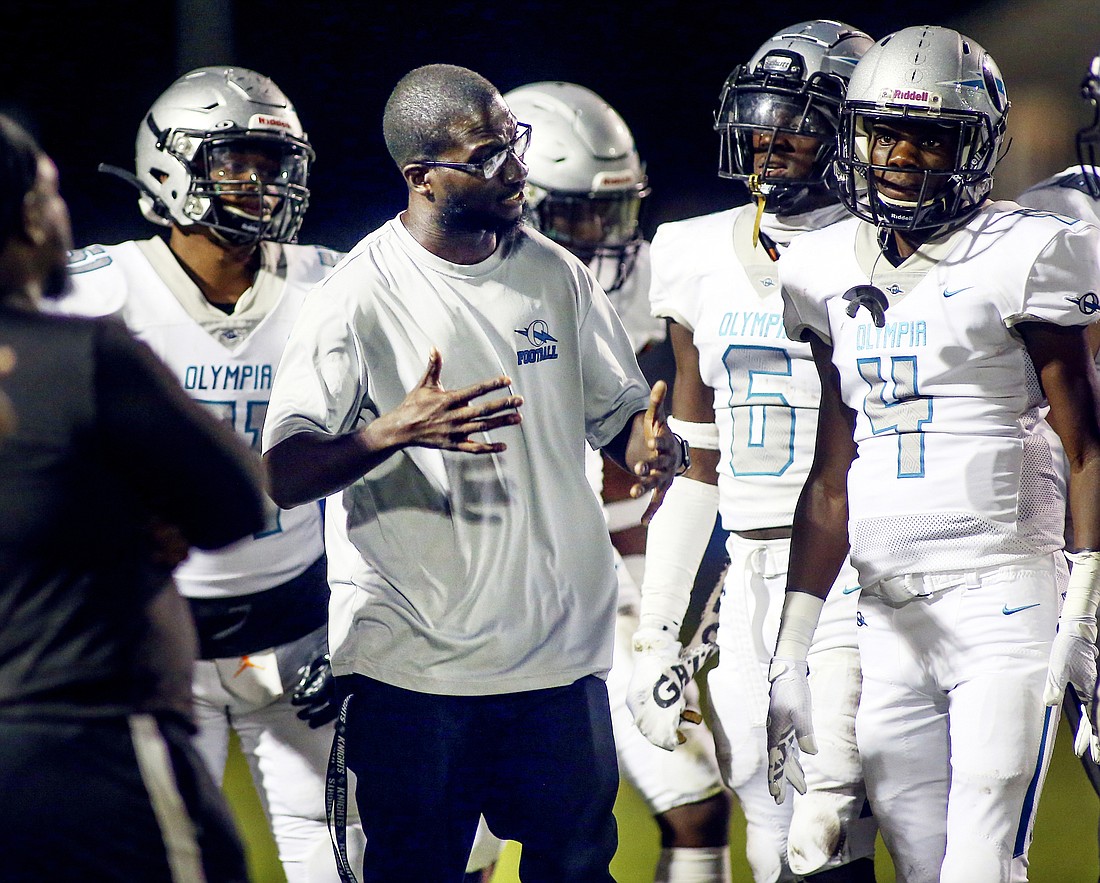- April 25, 2024
-
-
Loading

Loading

“We need football.”
On the surface, those three simple words may not sound like much, but for local football coaches, they mean more than just the desire to get back to the game they love.
During times of great distress, sports have always been a consistent presence in the lives of many — it’s a reprieve from the anxiety of the unknown. It’s why sports, right now, is a need and not a want, Olympia football coach Travis Gabriel said.
“When you have the coronavirus, and you have the racial tension going on out here in the world, sports brings everybody together,” Gabriel said. “When kids put on those helmets and shoulder pads, all of them are the same color. As I tell my kids, ‘Y’all all the same color when you put on those white jerseys — all of y’all are white — and when you put on those gray jerseys, y’all are all gray.
“That is the missing piece,” he said. “That’s why we need to get it back going as soon as possible, but at the same time respecting and understanding that we have this coronavirus (pandemic).”
The protests and riots that have broken out across the country since the death of George Floyd hit close to home for the area’s black coaches. In Gabriel’s case, it’s a reminder of the difficulties he faced with police growing up in an underprivileged area of Miami years ago.
“I witnessed the police brutality for many years,” Gabriel said. “I’ve been stopped by the police as a 9-, 10-, 11-year-old kid — they (had) us on the wall, flashlights and everything shined in our face and dog-cussing us. I’m 9 to 10 years old, and I’m like, ‘What are we doing? We are just walking down the street.’”
It’s difficult to find a silver lining with these types of issues, but it can be used to teach lessons to players — some of whom have dealt with racism themselves.
First-year Windermere head football coach Derrick Bumpers — one of six black football coaches in the area — said he is going to speak to his players and staff, although he would prefer to do it in person. As someone who has experienced being profiled for his skin color, Bumpers’ lesson will be that the only thing that truly matters is what’s inside.
“I don’t look at any kid as far as color is concerned — I look at their heart, their character and their ability,” Bumpers said. “Me, as a coach, I teach that you have to trust the man next to you — don’t look at his color. He has to be able to play beside you and you guys have to play together.”
As coaches continue to help guide their players through the racial tensions of the day, there is also the seemingly never-ending coronavirus pandemic.
For first-year coaches such as Bumpers and West Orange High’s Mike Granato, it’s been tough establishing their culture of football and getting to know their players.
During the extended time away from athletes, Granato said he has been trying to have Zoom meetings every day, but it’s just not the same.
“The biggest thing is we always talk about setting your brand, setting your culture, so not being able to be around the guys for the better part of five months — it seems — has been challenging,” Granato said. “It’s trying times given the fact that we can’t be together — there’s only so much you feel like you can get across in an online Zoom session.”
And being away from players hasn’t just affected growing relationships. With no spring football, it also has been a hindrance to setting up kids for success on the field at both the high school and collegiate levels, Gabriel said.
“The biggest thing is we always talk about setting your brand, setting your culture, so not being able to be around the guys for the better part of five months — it seems — has been challenging.”
— Mike Granato, WOHS football coach
“Losing spring football hurts us as coaches, because we weren’t able to evaluate a lot of kids,” Gabriel said. “And it hurts us as coaches trying to help get our kids recruited — we weren’t able to do that. Unless you’re a three-star, four-star or five-star kid, you needed that spring, because that’s the time when college coaches would be able to come out and watch you practice.”
Furthermore, the National Federation of State High Schools recently published a 15-page document that details a three-phase approach to getting high school sports back and operating. Among the plans for football practices are no tackling, no exchange of the football from one player to another and keeping groups to less than 10 people.
No one knows if these precautions will be put into effect — it’s ultimately up to the county on how high school sports return.
Teams already have missed out on the beginning of spring workouts — which should have started Monday, June 1 — and the three weeks of preseason football training that is planned starting July 27 are still unclear.
Despite the uncertainty of what lies ahead, coaches are going to do whatever they can to keep themselves and their players safe and ready for the new season, Granato said
“I know the country, our state, our district, our players and our parents — they’re itching to get their kids out of the house and back to doing what they want to do,” Granato said with a laugh. “We’re just going to hope and pray, and essentially have a plan for every situation that gets thrown at us. That’s all we can do.”